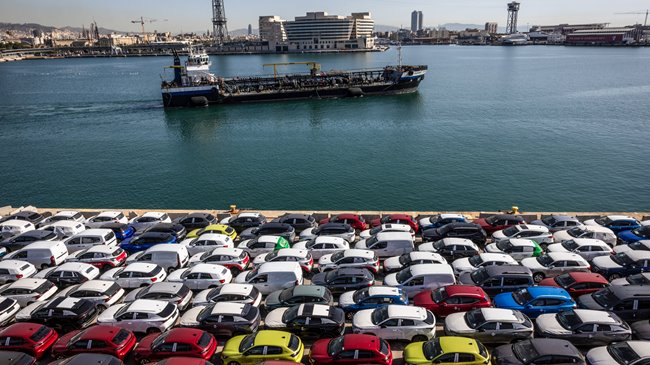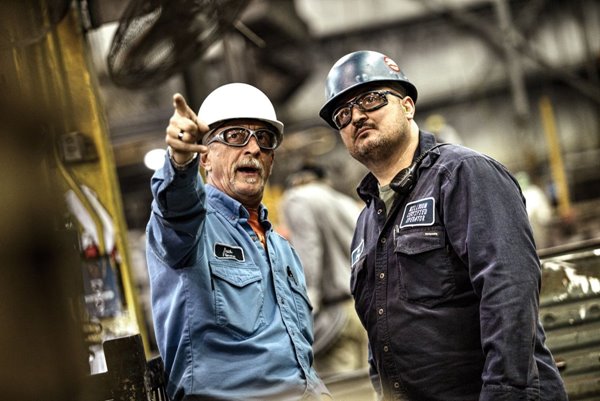Automakers alter production plans and vehicle pricing as auto tariffs take effect
John Irwin | Automotive News
As the 25 percent tariff on imported vehicles launched, some automakers responded with layoffs and production cuts while others detailed pricing discounts or plans to boost U.S. manufacturing.
Vehicles imported to the U.S. are now subject to the tariff, after President Donald Trump’s long-promised auto levies went into effect April 3.
The initial reactions are likely just the beginning of a global reordering of the auto industry.
Analysts and executives forecast dramatically higher new-vehicle prices, lower profits and disruptions in new-vehicle production. Those expectations sent shares of automaker, supplier and dealer stocks plunging in the days following the tariffs’ implementation.
Trump launched the tariffs as part of a broad strategy to force companies to build more domestic factories and create more manufacturing jobs in the U.S.
“We will supercharge our domestic industrial base, we will pry open foreign markets and break down foreign trade barriers,” Trump said. “Ultimately, more production at home will mean stronger competition and lower prices for consumers.”
But automakers, suppliers and analysts said it can take years to build new factories and relocate production. Some are already raising prices to cover the extra cost of importing vehicles to the U.S.
“Consumers will feel financial pain faster than they will see new jobs through any investment the tariffs may encourage,” Stephanie Brinley, principal automotive analyst at S&P Global Mobility, said in an email.
Brinley said some automakers will likely stop selling certain models in the U.S. rather than try to sell them with a 25 percent tariff.
Analysts expect new-vehicle prices to rise, even for U.S.-made vehicles. Prices on lower-cost American vehicles could rise by between $2,500 and $4,500, while imported models from Europe and Asia could be subject to price increases of up to $20,000, according to an estimate by Anderson Economic Group.
The tariff applies to the value of the entire vehicle imported from all countries except for Canada and Mexico. Vehicles made in those countries that comply with the United States-Mexico-Canada Agreement’s free trade rules are subject to a 25 percent tariff only on their non-U.S. content.
Imports accounted for about 45 percent of U.S. new-vehicle sales in 2024. Mexico, Japan, South Korea, Canada and Germany are the biggest suppliers.
The auto tariff will expand to parts by May 3, the deadline the U.S. set for itself to begin collecting duties on certain components.
The list of auto parts that will be subject to a 25 percent tariff is extensive and includes engine, transmission and various safety components. If those components are made in Canada or Mexico and comply with the USMCA, they will not have duties until the U.S. comes up with a mechanism to place a levy only on their non-American content.
Trump also announced another round of import taxes April 2, levying so-called reciprocal duties of at least 10 percent on most nations beginning April 5. Individualized tariff rates as high as 46 percent on certain countries then begin April 9.
Reciprocal duties do not apply to vehicles or parts subject to the auto tariff. But certain other parts such as some braking components and advanced driver assistance systems could be subject to the new reciprocal levies because they are not included in the auto tariff, analysts said.
Here is a look at how the auto industry began grappling with the tariffs.
Automakers alter North American production, import plans
Stellantis temporarily laid off 1,000 workers in the U.S. as it pauses production at some plants in Canada and Mexico because of the tariffs. The affected U.S. workers are employed at five plants in Michigan and Indiana, a company spokesperson said.
The automaker said its plant in Windsor, Ontario, which builds the Chrysler Pacifica and Voyager minivans and the electric Dodge Charger Daytona, will shut for two weeks starting April 7. Its assembly plant in Toluca, Mexico, which produces the Jeep Compass and new electric Jeep Wagoneer S, will be down from April 7 through the end of the month.
Likewise, Infiniti paused production of two Mexico-built crossovers for the U.S. market. In an April 3 retailer memo, Infiniti Americas Vice President Tiago Castro said QX50 and QX55 output bound for U.S. dealerships is halted “until further notice.”
Audi is holding all vehicles assembled in Mexico and overseas and delivered to U.S. ports after April 2, while Volkswagen has halted rail shipments of vehicles built in Mexico to the U.S. VW builds the Jetta compact sedan, the Taos subcompact crossover and the Tiguan compact crossover in Mexico.
Other automakers detailed plans to increase U.S. output in response to the tariffs. Nissan, which had planned to terminate a shift at a plant in Tennessee, reversed its decision because of the tariffs, with the goal of keeping Rogue crossover supply flowing.
Mercedes-Benz, meanwhile, is considering shifting production of another model to its Tuscaloosa, Ala., assembly plant. General Motors is boosting production of Chevrolet Silverado and GMC Sierra pickups at a plant in Indiana.
Trump officials and UAW President Shawn Fain have argued tariffs will quickly boost U.S. manufacturing output at factories with excess capacity. U.S. assembly plants were operating at about 70 percent capacity in 2024, according to GlobalData.
“There is excess capacity all over this country right now,” Fain said during an April 3 interview on CNN.
VW, Ferrari, Ineos increase prices; Ford, Stellantis offer discount
VW plans to add an import fee to the destination charge on vehicles assembled in Mexico and Europe. It also anticipates production at its Chattanooga plant to be impacted as well, but it was not clear how.
Ferrari plans to increase prices on the the Purosangue, 12Cilindri and F80 by up to 10 percent, while Ineos Automotive will raise prices for U.S.-bound vehicles by up to 11 percent.
Meanwhile, Ford and Stellantis said they would make employee discounts available to all customers. Ford’s offer expires June 2. The Stellantis program runs through April 30. The promotions give customers potentially thousands of dollars in discounts as a way to counter consumer fears about rising prices.
Other automakers such as Hyundai are standing pat for now.
“We have seen the tariff announcement, and we are evaluating the impact,” Hyundai Motor CEO Jose Muñoz said at the Seoul Mobility Show on April 3. “We will always remain competitive, and there are no plans to raise prices in the United States at this time.”
Canada, Mexico, China, E.U. respond
Governments around the world quickly responded to the auto and reciprocal tariffs.
Canadian Prime Minister Mark Carney implemented auto tariffs that mirror those the U.S. put in place. American-made vehicles are subject to a 25-percent duty. Like with the U.S. tariffs, vehicles that comply with the USMCA will only be subject to duties on the non-Canadian content in the vehicle.
Mexico is negotiating with the Trump administration to reduce the impact of tariffs on auto parts and finished vehicles with the goal of reaching a deal in the next 40 days, Mexican Economy Minister Marcelo Ebrard said at a press conference April 3.
China, meanwhile, implemented a 34 percent tariff on all U.S. goods. That was in response to Trump instituting a 34 percent tariff on Chinese goods starting April 9.
The European Union has vowed a swift response.
“If you take on one of us, you take on all of us,” European Commission President Ursula von der Leyen said.

